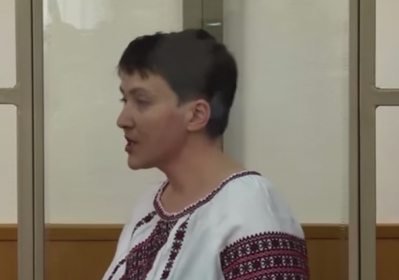Savchenko demands that everybody give testimony using a lie detector

Nadiya Savchenko is probably facing a 25-year sentence at the end of the ‘court trial’ which began on Sept. 22, but the customary “if she is found guilty” seems entirely out of place. Nobody seriously believes that Leonid Stepanenko and two other judges, seemingly from the Russian Donetsk City Court, are any more than actors in the spectacle unfolding. So too were the unidentified individuals in the courtroom used as the excuse for not allowing journalists to watch the hearing. The press were forced to watch by video.
It should be noted that none of the above is in any way contentious. On Sept 17, an EU statement yet again reminded Russia that one of the requirements of the Minsk Package is the “release of all hostages and illegally detained persons”. All democratic states have demanded the release of Savchenko, Oleg Sentsov, Oleksandr Kolchenko and other “illegally detained Ukrainian citizens in Russia and on the illegally annexed Crimean peninsula”.
The 34-year-old former military pilot and now Ukrainian MP was brought to the court in (Russian) Donetsk by police van from Novocherskassk 150 kilometres away. There is no good reason for the trial to be held in this obscure city in the Rostov oblast, which has presumably been chosen in an attempt to minimize international attention to the case. As reported, at a hearing on jurisdiction on Aug 21, the judge claimed that the fact that witnesses in the case live in Moscow, Moscow oblast and in Voronezh (and nobody in Russian Donetsk) was not sufficient reason for moving the trial.
As during the first preliminary hearing, the security appears to have been, as defence lawyer Mark Feygin said, “like Fort Knox”, with armed police guarding all the roads and entrances to the court.
Savchenko told the court that she obviously denied all guilt. She demanded to be allowed to give all her testimony using a lie detector, and that others do the same.
Mediazona reports that defence lawyer Ilya Novikov applied for all supposed ‘victims’ who are Ukrainian nationals to be removed from the case. He pointed to the claim made by the head of the Investigative Committee, Alexander Bastrykin, in a recent interview about Russia’s alleged ‘universal jurisdiction’ to investigate such cases. Novikov disputed this, saying that Russia has a Criminal Code which restricts ability to view such cases and makes ‘universal jurisdiction’ impossible.
As unfortunately expected, the application was rejected by the presiding judge without any pretence of consultation with his colleagues.
Novikov also challenged the list of so-called victims, saying that there were grounds for believing that some had been taking part in the fighting. “Their deaths are evidence that the shelling was not against civilians, but against armed fighters”.
The defence demanded that the case be sent for further examination, and said that the Investigative Committee knows that it was fighters who died in the place shelled, not civilians, but finds that an inconvenient fact.
The prosecutor then alleged that the defence was working against Savchenko’s interests and should be removed from the case. This was also not upheld.
A major part of the proceedings were taken up with the reading of the 180-page indictment. Savchenko was asked if it was all clear and if she had a response. She did: “It’s all lies”. It was here that she demanded the lie detector.
Nadiya Savchenko again reiterated in court that she had been abducted from Ukraine and taken by force to Russia. She had not seen the two journalists whose deaths she is accused of complicity in and she has never in her life shot at people who are unarmed.
Two people with victim status – the widow of Anton Voloshin, the cameraman who died on June 17 in mortar fire and Voloshin’s father - were questioned by video from the Moscow region. It was clear from their accounts, in part responding to questions from Savchenko who changed into Russian, that Voloshin had not been either trained or properly equipped for reporting from an area where fighting was underway. He was not, for example, wearing a bullet-proof vest.
The next hearing is scheduled for Sept 29.
Nadiya Savchenko was taken prisoner in the morning of June 17, 2014, several hours before Voloshin and journalist Igor Kornelyuk came under mortar fire while reporting from an area in the Luhansk oblast where there was heavy fighting.
She was captured by Kremlin-backed militants who even posted a video of her being interrogated. It first became clear that she was in Russia when a court in the Voronezh oblast (nowhere near where the trial is now taking place) remanded her in custody.
For a long time the Russian investigators were silent about Savchenko’s abduction. Then they claimed that she had escaped and inexplicably crossed the border into Russia. The final version is that the militants themselves ‘released her’, after which she allegedly hurtled towards the Russian border, covering a huge distance in an hour and a half.
The investigators’ version is that she crossed the border illegally ‘pretending’ to be a refugee, and that she was stopped initially in a routine check of papers. The Investigative Committee responded with particular cynicism to the demand from the Parliamentary Assembly of the Council of Europe (which Savchenko is now a delegate of) by adding another charge of having ‘crossed the border illegally’.
As mentioned the charges are now of murder and attempted murder. The prosecution has failed to find the binoculars with which Savchenko is supposed to have seen the journalists 3 and a half kilometres away and the equipment with which she is alleged to have informed Ukrainian soldiers of their whereabouts. And she has an alibi.
More details here: Savchenko material shows how Russia concocted ‘case’ and what it can’t conceal





